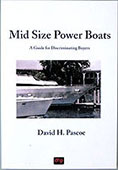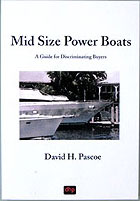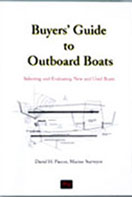Your First Boat
Part I
by David Pascoe
By far, the most frequently asked question we get in our emails is the one by first time boat buyers asking about what brand they should buy. Bewildered by literally hundreds of choices out there, they have neither the knowledge to make an informed choice, nor any place to turn for answers.
Indeed, we're almost as bewildered as they are. It would take a cast of dozens of experts just to survey the field of new offerings every year, not to mention hundreds more experts to assess the existing millions of used boats. That's a feat no one has yet managed to tackle. That's why no one just give you a list of recommended boats. We can't just line boats up on a counter top and evaluate them; they're too big and the boats can't come to us, we have to go to them.
So it is that all of you who make internet searches for serious information on boats, like we provide in our boat reviews, aren't going to find it. Not many people are willing to risk getting sued by publishing negative information. It's far easier to go with the flow.
It's been said that the Internet has been largely responsible for creating better informed consumers. This comes mainly though complaints on forums and web sites like "My Crappy Larson" at Griperadio.com. We agree. Nowhere else can information be rounded up and transmitted so rapidly and made available to such a wide audience. But it has also led to a higher level of wariness by first time boaters that have cruised the forums and have heard the horror stories of first time buyers who have gotten burned.
So what to do? Well, our first recommendation is one that won't sit too well with many first time buyers who are intent on purchasing a new boat. That's because our suggestion is to buy a used one. Yes, an used boat.
Oh, we've heard the arguments about buying someone else's troubles a hundred times over. But since when don't new boats have problems? How many times does the typical new boat owner have to lug his boat back to the dealer for warranty work? Much too often, if our experience is any indicator.
The fact is that there are huge economic and reliability advantages in purchasing a boat that has been pre owned and pre tested, if I may use that term. A boat that has been used for a couple of years has been out there banging around on the waves. If there's anything that's not right, anything that's going to break, it is likely to have already done so. If the deck is going to pop loose from the hull because it was fastened with aluminum rivets, a quick glance at it will surely tell the story.
But the new boat has a warranty, you say? Sure, but how many heart aches do you want to go through seeing to it that the warranty gets properly honored for a brand new boat that clearly has problems?
The economics make even greater sense. Take a cue from larger boat buyers. Over 90% of all boats over 30 feet sold every year are USED BOATS! Ninety percent. And we're talking here boats of up to ten times the value of the typical entry level runabout. Take it from the more experienced boat owners who know value when they see it; used boats are a tremendous value. Let me explain why.
Let's say that the new twin outboard, twenty foot runabout you're looking at can be had for $40,000 straight out of the box. A comparable model that's four years old sells for $20,000. That's a whopping $20,000 difference. And for whatever may be wrong with the used one, that twenty thousand will cover the cost of repair of any problems many times over. And the higher the price, the greater the new/used price spread is going to be.
And keep in mind that part of what you are paying for with a new boat is the fancy dealer show room, as well as his profit.
What greater inducement can be offered a first time buyer? And even if your purchase does turn out to be a mistake, it will be a mistake that only costs about half as much.
Outboard -vs- Stern Drive Many people still aren't clear on this point, yet getting the right criteria to make a decision is simple.
- If a boat is to be left afloat in sea water, outboards are the best option. Why? Because outboards can be lifted up out of the water; stern drives can't.
- Stern drives are fine for fresh water and those who keep their boats in dry storage.
Closed -vs- Raw Water Cooling Systems This applies to any type of inboard power. This choice is also a simple one.
- If you're operating in sea water, the closed cooling system should be considered mandatory. Sea water does the same thing to your engine as salt on the roads in winter does to your car. And sometimes the corrosion damage occurs very, very quickly.
- If you're operating in fresh water, you do not need a closed cooling system and there's no point in paying the extra cost.
Does this apply to outboards? No. The outboard motor sits vertically on the drive unit. When the engine stops, all the cooling water runs out by means of gravity, so internal corrosion is not the same problem as it is with inboard/stern drives without closed cooling systems.
Brands When it comes to quality and separating the wheat from the chaff, this is not an easy task. Asking others is one way to get information. Try taking a trip to the local marina or launching ramp on Saturday and start asking questions. But beware that most boat owners take boat ownership personally. Many are reluctant to admit that the boat they own is not all that it should be. If a guy says that his boat is the greatest thing on the water, he may not be giving you the whole story. Assuming he knows the whole story. Not many people are willing to admit to making a mistake.
Conversely, a guy who says his boat is a pile of junk is probably so irritated with the thing that he'll probably be glad to show or tell you exactly why. So take him up on it. Or at least ask a few pointed questions. The unhappy owner is usually a better source of accurate information. On the other hand, if the owner can give you some very specific reasons why he likes his boat, by all means listen to him.
Price is the other major part of the equation. Generally speaking, repeat, generally speaking, higher prices indicate higher quality. The problem is that with a new boat, it's tough to prove that claims to higher quality are really valid until the boat has been put to the test.
So once again we come full circle to fact that the used boat usually represents the better buy. It's been put to the test, so that if it does have problems, at least you have the opportunity to discover those problems by getting it surveyed.
What about the "experts"? Could you hire a surveyor to advise you? When it comes to small boats, probably not. The fact is that there's no money in small boats for surveyors, so there are probably very few that would even try to specialize in building a wealth of information about small boats. Besides, there are too many of them.
The bottom line is, whether you buy new or used, that when making that first boat purchase, there is some risk involved. Keep in mind that boat builders are very, very small companies, not the likes of a General Motors or Honda with billions of dollars in resources. Boat builders come and go with considerable frequency. Some aren't very good with, or even have the ability to give good warranty service. Hence, that fabulous warranty the salesman touts may have a different basis in reality.
Therefore, the element of risk isn't all that great between buying a new boat or used. Of course, we'd recommend that you get any used boat you buy surveyed first. That will cut the element of risk right down to size.
Related Reading - Mid Size Boat Purchase:
Originally posted at www.docksidereports.com

















David Pascoe is a second generation marine surveyor in his family who began his surveying career at age 16 as an apprentice in 1965 as the era of wooden boats was drawing to a close.
Certified by the National Association of Marine Surveyors in 1972, he has conducted over 5,000 pre purchase surveys in addition to having conducted hundreds of boating accident investigations, including fires, sinkings, hull failures and machinery failure analysis.
Over forty years of knowledge and experience are brought to bear in following books. David Pascoe is the author of:
In addition to readers in the United States, boaters and boat industry professionals worldwide from nearly 80 countries have purchased David Pascoe's books, since introduction of his first book in 2001.
In 2012, David Pascoe has retired from marine surveying business at age 65.
On November 23rd, 2018, David Pascoe has passed away at age 71.
Biography - Long version